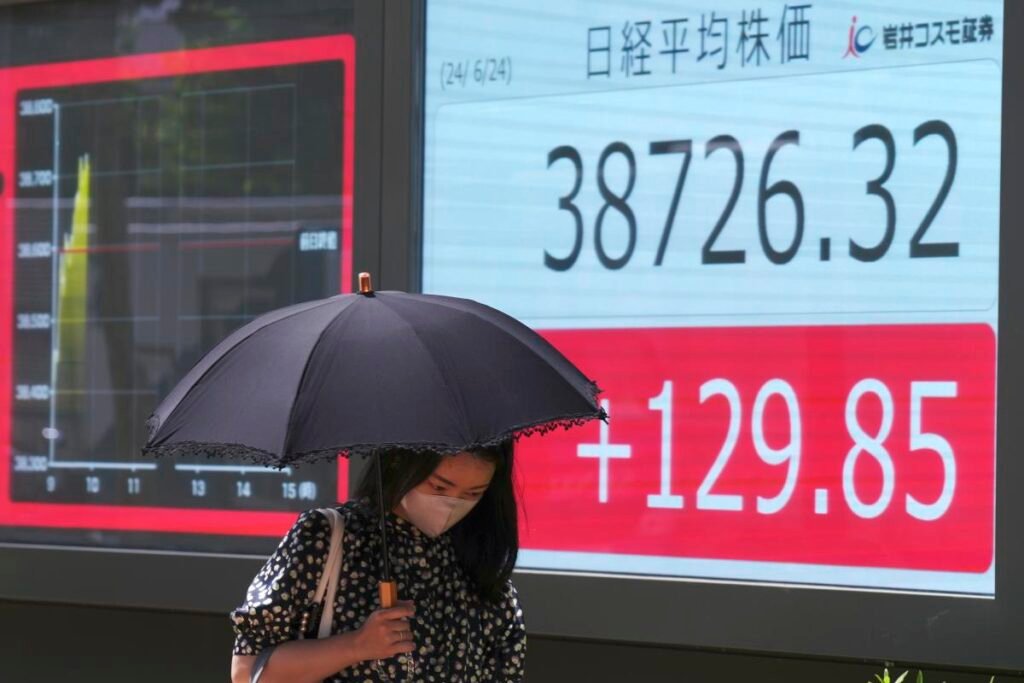HONG KONG (AP) — Asian shares were mostly lower on Monday as U.S. stocks ended their latest rising week on Friday, while Nvidia Inc.’s shares cooled further from their stunning supernova burst.
U.S. futures and oil prices fell.
In Tokyo, the Nikkei rose 0.7 percent to 38,869.94, making it the only major Asian stock index to rise on Monday.
In morning trading, the yen fell to 159.93 yen per dollar.
The minutes of the Bank of Japan’s last policy meeting published on Monday indicated that “a change in the policy rate should only be considered if economic indicators confirm that, for example, Consumer Price Index (CPI) inflation has clearly started to recover and medium- to long-term inflation expectations are rising,” putting fresh pressure on the yen.
Meanwhile, Finance Minister Masato Kanda was reported as saying authorities were ready to intervene at any time to support the currency.
Meanwhile, Hong Kong’s Hang Seng Index fell 1.2% to 17,815.42, and the Shanghai Composite Index dropped 1% to 2,969.59.
Australia’s S&P/ASX 200 fell 0.7% to 7,740.80. South Korea’s KOSPI fell 0.7% to 2,763.95.
The S&P 500 fell 0.2% to 5,464.62 on Friday, but remained near the all-time high it hit on Tuesday and marked its eighth consecutive gain in the past nine weeks. The Dow Jones Industrial Average rose less than 0.1%, to 39,150.33, and the Nasdaq Composite Index was down 0.2%, to 17,689.36.
Nvidia Inc. again dragged down the market, dropping 3.2%. The company’s shares have soared more than 1,000% since October 2022 on frenzied demand for its chips that underpin much of the world’s move toward artificial intelligence technology, briefly overtaking Microsoft this week to become Wall Street’s most valuable company.
But nothing goes up forever, and Nvidia shares have fallen over the past two days, marking their first losing week in the past nine weeks.
Most of the rest of Wall Street was relatively quiet, with a few exceptions.
In bond markets, U.S. Treasury yields initially fell after reports showed economic activity in euro zone countries was weaker than economists had expected. In continental Europe, worries are already building ahead of French elections that could further destabilize financial markets.
The weak business activity report pushed down European yields and initially weighed on U.S. Treasury yields, which recovered much of their losses after a separate report late in the morning said U.S. business activity may be stronger than expected.
A preliminary survey of U.S. manufacturing and service activity released by S&P Global showed that aggregate production growth hit its highest level in 26 months. Perhaps more importantly for Wall Street, the strength is likely occurring without any rising inflationary pressures.
“Historical comparisons suggest that this decline brings the survey’s price index in line with the Fed’s 2% inflation target,” said Chris Williamson, chief business economist at S&P Global Market Intelligence.
The Federal Reserve is in a precarious position, trying to slow the economy with high interest rates enough to bring high inflation down to 2%. The key is to lower interest rates at the right time. Wait too long and the economic slowdown could turn into a recession. Lower it too soon and inflation could re-accelerate.
The yield on the 10-year Treasury note fell slightly to 4.25% from Thursday’s close of 4.26%. The yield on the two-year note, which better reflects expectations for Fed policy action, fell to 4.73% from 4.74%.
In other trading on Monday, benchmark U.S. crude oil fell 8 cents to $80.65 a barrel in electronic trading on the New York Mercantile Exchange.
Brent crude fell 1 cent to $84.32 per barrel.
The euro rose to $1.0695 from $1.0691.

